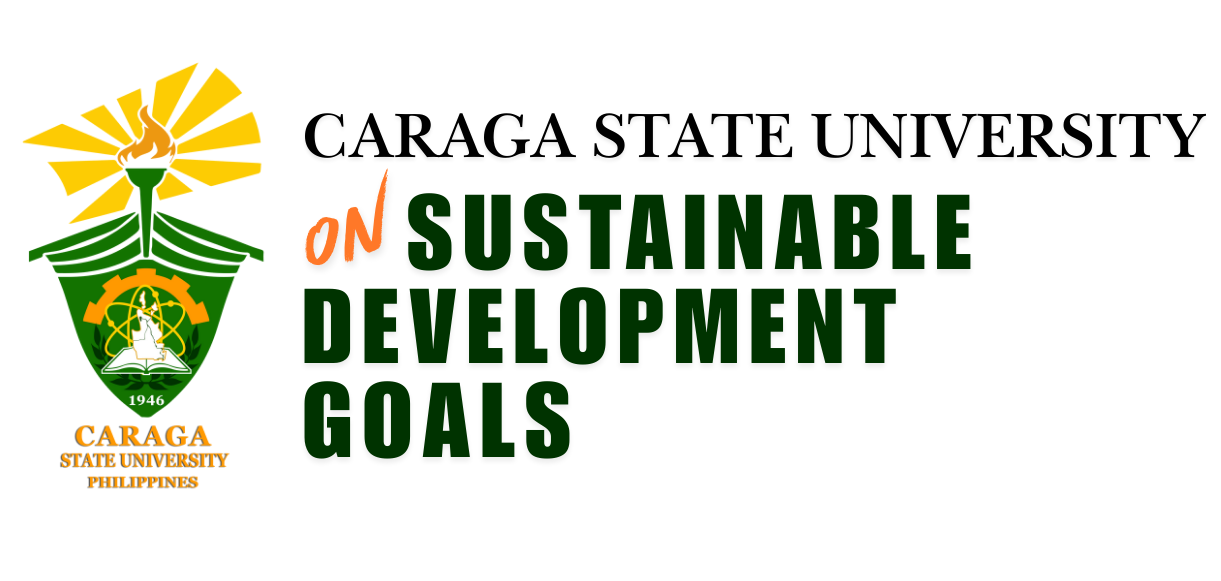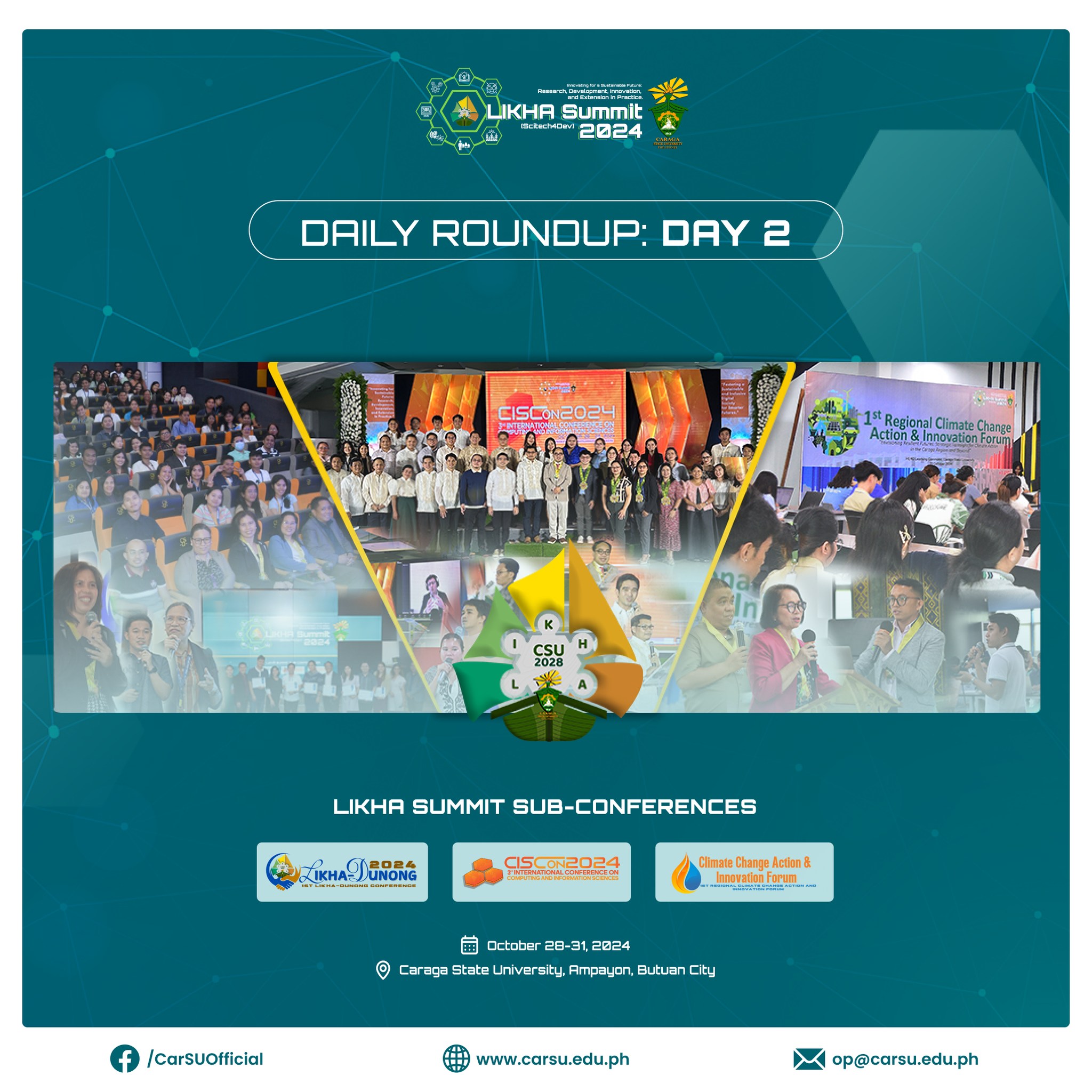𝗗𝗔𝗜𝗟𝗬 𝗥𝗢𝗨𝗡𝗗𝗨𝗣: 𝗟𝗜𝗞𝗛𝗔 𝗦𝗨𝗠𝗠𝗜𝗧 𝟮𝟬𝟮𝟰 𝗗𝗔𝗬 𝟮
It is the second day of the LIKHA SUMMIT 2024! Today, three sub-conferences were launched, including the inaugural LIKHA-DUNONG and the Regional Climate Change Action and Innovation Forum. The International Computing and Information Sciences (CISCon), on the other hand, is in its third year.
All conferences ran simultaneously, covering various fields aligned with the LIKHA Agenda.
–
The LIKHA-DUNONG aims to foster critical dialogue, ideas, and scholarly collaboration across diverse areas such as Language, Society and Culture, Lifelong Learning, Literacy, Music, Arts, Physical Education, and Health Education.
Ruth E. Sanchez, PhD, Dean of CSU College of Humanities and Social Sciences (CHASS), opened the conference, highlighting the purpose of the conference, which translates to knowledge creation. She encouraged the participants to cultivate enthusiasm for continuous learning.
LIKHA-DUNONG features plenary speakers Professor Miraluna L. Herrera, PhD, who shared her insights into understanding the essence and focus of research design; Francis Tom A. Paredes, PhD, on the contribution of teacher education institutions in the realization of the Mother Tongue Act; and Ordem K. Maglente, PhD on Mamanwa Health Practices: Insights for Innovation.
Parallel sessions ensued in the afternoon for the following areas: Arts, Language, and Wellbeing; Cultural and Social Studies; and Education and Pedagogy.
–
The 3rd International Conference on Computing and Information Sciences (CISCon 2024) brought together experts, educators, and innovators with a unified goal: to advance digital technology, making it smarter, more sustainable, and accessible to all.
Dr. Jeffrey T. Dellosa, Vice President for Research and Development, Innovation, and Extension (VPRDIE), sparked curiosity by asking, “What’s the next big thing for our university?” He emphasized the urgency of creating inclusive digital solutions for a future where technology benefits every sector of society. Dr. Vicente Pitogo, CCIS Dean, included in his speech the takeaways of his recent engagement in Shanghai, China, which were focused on the exploration of AI’s role in education, governance, and sustainable development – emphasizing the need for responsible policies and ethical use. He urged the participants to delve more into how AI’s future impact the society, from the potential to advance the UN’s SDGs to existential questions around AI autonomy and accountability.
In her keynote address, Dr. Sharina Binti Yunus, Assistant Professor from Universiti Teknologi Brunei, shared insights on making digital spaces inclusive and sustainable, closing gaps, and building smarter technology for future generations. Another keynote speaker, Prof. Raphael Weuts, Director of AI Strategy at KU Leuven, Belgium, discussed the need for strong AI regulations to guide the use of large language models, focusing on ethical standards and safeguards against misinformation and privacy risks.
CISCon 2024’s program was organized into three tracks with technical panels, facilitators, and presenters covering in-depth discussions and interactive sessions aimed at exploring the latest innovations, methodologies, and applications in each area:
Intelligent Systems and Data Science – From AI algorithms to data-driven decision-making, this track brought together experts and researchers to present the impact of data science across diverse industries and discuss advancements in machine learning, predictive analytics, and big data solutions.
Digital Innovation, ICT, Technopreneurship, and Engineering – Focused on the intersection of technology and business, presenters in this track examined how digital innovation and entrepreneurship can drive economic growth with emerging trends in ICT, engineering solutions, and sustainable technopreneurship practices.
Information Systems Practices and Applications – This track featured case studies and best practices for designing efficient, user-centered information systems. Presenters shared real-world applications that address contemporary challenges in system integration, cybersecurity, and digital transformation.
The conference concluded with closing remarks by the Chair of CISCON 2024, Professor Roland Abao. He encouraged the participants to further their stride towards a sustainable digital future by creating more intelligent systems from data-driven issues of society.
CISCON 2024 set a high academic and industry collaboration standard, guiding the technology sector toward a future that prioritizes sustainability, inclusivity, and digital accessibility for all.
–
The first Regional Climate Change Action and Innovation Forum centered on “Envisioning Resilient Futures: Strategic Foresight for Climate Action in the Caraga Region and Beyond.” The forum was a dynamic platform for insightful discussions, expert presentations, and collaborative sessions to address climate change through innovation and strategic planning.
Dr. Rolyn C. Daguil, President of Caraga State University (CSU), opened the event with an inspiring call to action, emphasizing the shared opportunity and responsibility in leading climate resilience efforts and urging participants to stay committed to climate action. Representing Engr. Dennis O. Celestial from the Department of Environment and Natural Resources – Environmental Management Bureau (DENR-EMB) Caraga is Ms. Daisiree Makilan, who underscored the importance of collective ideas and dedication to securing a protected future for all.
In the plenary sessions, Vincent N. Cotoron from CSU discussed the essential role of universities in science-based climate action, emphasizing their contribution through research, education, and community engagement in fostering disaster resilience and proactive local planning. Dr. Rowena P. Varela, on the other hand, highlighted the need for climate-resilient agriculture, detailing the impacts of climate change on agriculture and food systems while advocating for sustainable farming practices to secure food amidst environmental challenges. Jesalyn A. Guingguing of Agata Mining Ventures, Inc., presented sustainable mining practices, focusing on low-carbon and climate-resilient operations that integrate renewable energy and community involvement. Regin Rex Guerra, through Engr. Elfie Iris S. Baguio-Calimbao, explored the significance of a Greenhouse Gas (GHG) Inventory for local climate action planning, examining emission sources and their management. Following the presentations, an open forum allowed participants, including students and professionals, to engage directly with the speakers, making it a productive session as the speakers effectively addressed the audience’s questions.
In the afternoon, a parallel session featured seven research presentations from geological history to biodiversity conservation. These presentations showcased the region’s extensive scope of climate-related research, offering valuable insights into environmental assessment, conservation strategies, and ecological modeling.
The day ended with signing a Memorandum of Agreement between CSU and the Philippine National Volunteer Service Coordinating Agency to promote volunteerism in academics. Awards recognized outstanding contributions to climate action and innovation. The forum emphasized a comprehensive approach to climate action—integrating research, policy, and community engagement—and inspired a unified commitment to a resilient future for the Caraga Region and beyond.
–
The LIKHA Summit 2024 will conclude tomorrow with the Regional Pitching Competition for professionals called RAISE to Innovate and a closing ceremony.
Contributors: Mae Ann Adaro, Almar Dela Cerna, and Romel Bansag
Source: Caraga State University Facebook Page


